As we step into 2025, the technology landscape continues to evolve rapidly, with artificial intelligence (AI) taking centre stage.
AI-infused applications are no longer a novelty; they are becoming essential to modern business strategies. From streamlining processes to enabling dynamic customer experiences, the transformative power of AI is reshaping how we build and use software.
Here are my predictions for the key trends in AI-infused applications in 2025 and beyond.

1. AI Everywhere: Adding and Enabling AI Tools
In 2025, the focus will shift towards integrating AI capabilities across every facet of application development and usage. Businesses will prioritize embedding AI tools into their existing systems, not just as standalone features but as core components that enhance functionality. From intelligent document processing to predictive analytics, AI will increasingly become the backbone of modern applications. This ubiquitous integration demands scalable, adaptable tools that can evolve with the rapid pace of AI innovation.
2. Making Data AI-Ready
Data is the fuel that powers AI, but many organisations struggle to make their critical data accessible and actionable. In 2025, we’ll see a heightened emphasis on data readiness for AI.
Companies will invest heavily in data governance, cleaning, and accessibility to ensure their datasets can be leveraged seamlessly by AI models. By breaking down silos and adopting unified data strategies, businesses can unlock the full potential of their information, turning it into a competitive advantage.
3. Applications Built On-the-Fly
A groundbreaking shift is on the horizon: AI dynamically building applications in real-time. While this concept may seem futuristic, early iterations are already emerging.
In 2025, businesses will begin exploring how AI can not only automate application creation but also adapt these applications on-the-fly to meet changing user needs. To prepare for this evolution, organisations must focus on making their thinking, data, and processes AI-ready. This involves rethinking traditional development cycles and embracing more agile, AI-driven methodologies.
4. The Rise of AI Agents
AI agents will play a pivotal role in 2025. These agents will go beyond performing isolated tasks; they will collaborate to solve complex, multi-faceted problems. Imagine a network of AI agents seamlessly working together to optimise supply chains, personalise customer experiences, or even design and execute marketing campaigns.

To harness the potential of AI agents, businesses need to invest in orchestration frameworks that enable smooth communication and interoperability between agents.
5. Articulating Goals and Distinctives
As AI becomes more ingrained in applications, clarity of purpose becomes paramount. Organisations must clearly define their goals and identify what sets them apart in the market.
This clarity will guide AI implementations, ensuring they align with business objectives and deliver measurable value. Thoughtful goal setting and a focus on distinctives will help companies avoid the trap of adopting AI for AI’s sake and instead use it as a strategic enabler.
Check out our AI Strategy workshop.
Preparing for the AI-Infused Future
The rapid advancements in AI model capabilities mean that companies can no longer afford to wait and see. Instead, they must proactively retool their applications and processes to align with the AI age. By embedding AI tools, making data accessible, exploring dynamic application development, leveraging AI agents, and articulating clear goals, businesses can position themselves to thrive in 2025 and beyond.
If you would like to see how the app innovation practice here at Transparity can help, get in touch.



